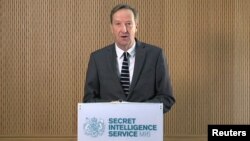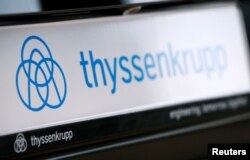Britain and Western nations are facing grave threats to their security and political systems from the hostile propaganda output and cyber attacks by rival states, the head of Britain's espionage service MI6 warned Thursday. Alex Younger, in his first major public speech as "C," the designation given the head of the Secret Intelligence Service, singled out Russia for its high-tech subversion.
Speaking to reporters at MI6's headquarters on the River Thames in central London, Younger warned that “the risks at stake are profound and represent a fundamental threat to our sovereignty.”
He added, “The connectivity that is at the heart of globalization can be exploited by states with hostile intent to further their aims deniably. They do this through means as varied as cyber attacks, propaganda or subversion of democratic process."
Hearings planned on hacking
The MI6 chief's warning comes as pressure mounts on U.S. President Barack Obama from congressional Democrats to disclose more information on Russian hacking activities during the 2016 U.S. elections. The White House has not responded to a letter signed last week by every Democrat on the Senate Intelligence Committee, calling for the declassification of "additional information concerning the Russian government and the U.S. election."
In a rare public statement in October, U.S. intelligence chiefs accused the Kremlin of being behind the hacking of the Democratic National Committee's computer system and of the email's of Hillary Clinton's campaign staff. The computer intrusions were directed by some of "Russia's senior-most officials" in an unprecedented effort to influence the elections, the chiefs said.
Democratic and Republican lawmakers say they plan to hold formal hearings into what they worry was meddling by Russian in the U.S. presidential race. Fears are mounting among Western officials that the Russian intelligence services will target the coming elections in Germany and France.
Complex, risky work
Britain's Alex Younger said in his remarks that high-tech subversion "should be a concern to all those who share democratic values." British spies trying to defeat the threat face complex and risky work. The British intelligence chief also hit out at Russia for its military backing of the regime of Syrian President Bashar al-Assad, warning that the risks mount of more Syrians being driven toward extremism.
"In defining as a terrorist anyone who opposes a brutal government, they alienate precisely that group that has to be on side if the extremists are to be defeated," he said. “Meanwhile, in Aleppo, Russia and the Syrian regime seek to make a desert and call it peace. The human tragedy is heartbreaking," he added.
The terrorist threat to Britain and Europe from militant groups such as Islamic State would continue as long as the Syrian civil war raged, he said.
Russia waging “hybrid war”
U.S. intelligence analysts say they have been monitoring hundreds of fake news and disinformation sites that can be traced to Russia — all part of a broader effort to interfere with Western democracy and weaken established parties.
In July, a senior European Commission official said that Russian propaganda had deeply penetrated all EU member states, helped by local politicians eager to exploit the confusion sown for their own purposes.
Speaking in Brussels, Jakub Kalenski, a member of the European External Action Service task force assigned with studying Russian propaganda, said Russian-sourced disinformation can be seen across Europe, and he argued Russia is waging a "hybrid war."
According to Kalenski, the Kremlin is matching different tactics and methods depending on the countries being targeted. In the Baltic countries, the target is the Russian-speaking population, via Russian television channels, said Kalenski; but, in Central European states such as Poland, Hungary and the Czech Republic, the subversion is more disguised, with hundreds of disinformation websites being used. In Scandinavia, propaganda was being put out on social media by state-sponsored internet trolls posting inflammatory comments.
German company targeted
This week, U.S. President-elect Donald Trump questioned claims that Russia interfered in the U.S. elections via cyber warfare. "I don't believe they interfered," Trump said in an interview with Time magazine; but, he did acknowledge they could be included in a list of those possibly responsible for the hacking of Democratic computers.
“It could be Russia. And it could be China. And it could be some guy in his home in New Jersey. I believe that it could have been Russia and it could have been any one of many other people, sources or even individuals,” Trump said.
Meanwhile, in Germany, the steel-making and engineering giant ThyssenKrupp disclosed Thursday that hackers had stolen technical trade secrets earlier this year. “ThyssenKrupp has become the target of a massive cyber attack,” the corporation said in a statement.
ThyssenKrupp executives said the hackers were located in southeast Asia. The company did not detail what secrets had been stolen. The company's product range includes industrial machines and shipbuilding and it is highly active in defense production, including building submarines for Israel.






